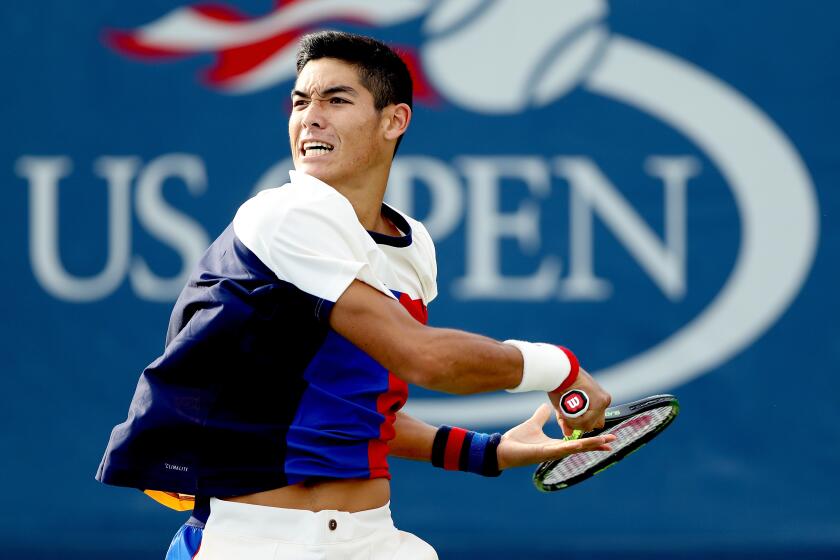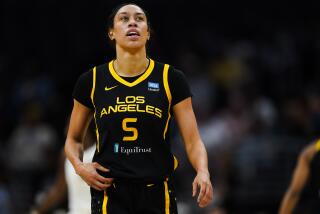Column: USA Hockey’s Lamoureux twins balance elite competition with motherhood
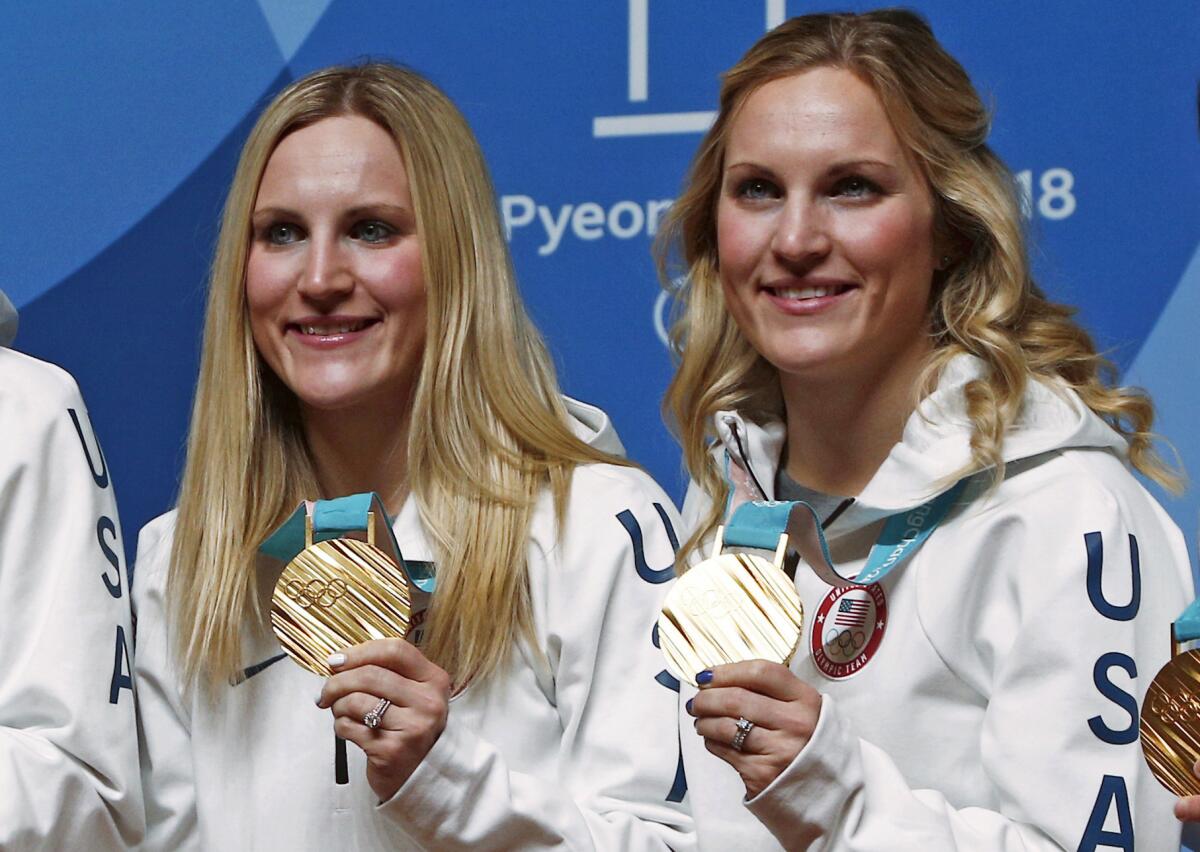
- Share via
When twins Monique and Jocelyne Lamoureux joined other members of the U.S. women’s hockey team in 2017 to fight for equitable treatment in pay and benefits they didn’t know they’d be the first players to take advantage of the maternity and child-care provisions in their new labor agreement with USA Hockey.
Monique, who uses the last name Lamoureux-Morando, gave birth to a son named Mickey in December 2018, 10 months after the U.S. women ended a 20-year Olympic drought and won the gold medal at the Pyeongchang Games. Jocelyne, who goes by Lamoureux-Davidson, delivered a son named Nelson in January 2019. The three-time Olympic medalists, 30, returned to play in Team USA’s Rivalry Series against Canada while they learn to handle the often conflicting demands of motherhood and of being world-class hockey players.
“I think it’s certainly been the most challenging thing we’ve been through individually as athletes,” Lamoureux-Morando said last week while the team trained in Irvine. “All moms go through it and I don’t think you ever really find a perfect balance. It’s a day-to-day thing of managing. It’s certainly been rewarding that we’ve been able to get back at an elite level again in a short period of time, but it certainly has been challenging throughout the process.”
The Rivalry Series was born as part of an agreement that averted a player boycott of the 2017 world championships. It provides precious opportunities to play meaningful games and is an ideal showcase for the sport, which has made tremendous gains in skill and technique since women’s hockey made its Olympic debut in 1998. Canada-U.S. games are always fierce, and it’s a treat to see them compete in between Olympic tournaments.
Team USA’s Rivalry Series against Canada
The Kings are transitioning from their veteran Stanley Cup-winning teams to a faster group whose young players must take scoring and leadership roles.
The U.S. won the first two games of the series but Canada prevailed in overtime Monday in Victoria, Canada. The fourth game will be played Wednesday at Rogers Arena in Vancouver. A record crowd for a U.S. women’s national team game is expected for the series finale Saturday at Honda Center, with more than 11,000 tickets sold as of Tuesday for the U.S. team’s first game ever in Southern California.
The game will make history but it’s also about the future because the series is providing coach Bob Corkum an extended opportunity to assess candidates for this year’s world championships roster and the 2022 Beijing Winter Olympics.
“We’re looking to see what we have in the stable and how the pieces fit together, and get to know them and have them get to know us as well,” said Corkum, an original Mighty Duck who has coached the U.S. women for a year and a half and guided them to the 2019 world title. “There are so many young, exciting players coming up that they’re really pushing the older players for jobs and I think it’s healthy.”
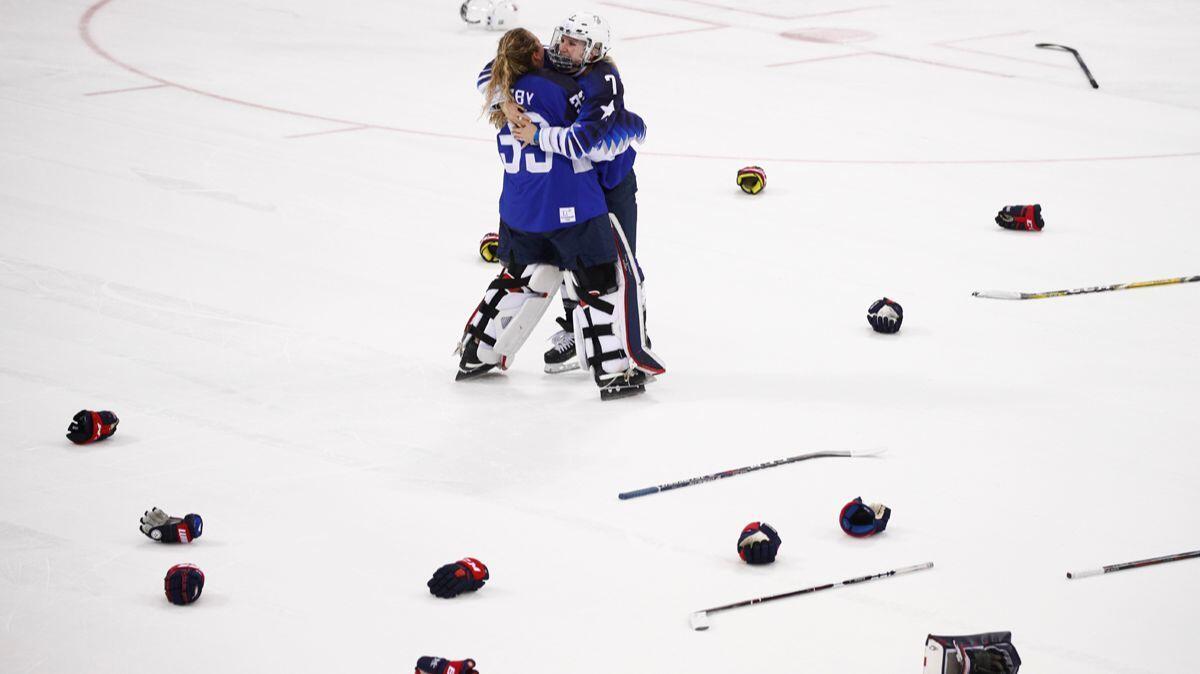
Neither Lamoureux-Morando, who scored the tying goal late in the gold-medal game at Pyeongchang, nor Lamoureux-Davidson, who later made a brilliant effort on the shootout winner, has scored in the first three games of the Rivalry Series. They’re still finding their timing and pre-motherhood form.
“Every day is a new challenge of balancing what you need to get done as an athlete and a professional but also prioritizing being a mom,” Lamoureux-Davidson said. “I think the best thing or the best advice we’ve been given is just allow yourself to be where you’re at. So if we’re with our kids, we’re totally engaged. We try not to worry about what work has to get done. And then if we’re at the rink or at an event, we’re there. We’re present and allowing ourselves to be engaged and present for everything that we’re doing. It’s definitely been the hardest thing we’ve done but also the most rewarding.”
They didn’t bring their babies along for this segment of the series, though they took both boys to a camp in Lake Placid, N.Y., last August. The new provisions meant they got their regular stipends from USA Hockey while they were pregnant and child-care stipends after they gave birth. They also were guaranteed two invitations to two camps after they became moms.
The injustices elite female athletes have faced during and after pregnancy came to the forefront last year when a group of runners that included Allyson Felix, Alysia Montano and Kara Goucher spoke out about their pay having been reduced by sponsor Nike because they couldn’t perform at their pre-pregnancy levels. “When you look at just the average working world, when women go on maternity leave it’s called disability. You’re not disabled,” Lamoureux-Davidson said. “I think just in general the mind-set has to change around maternity leave in America.”
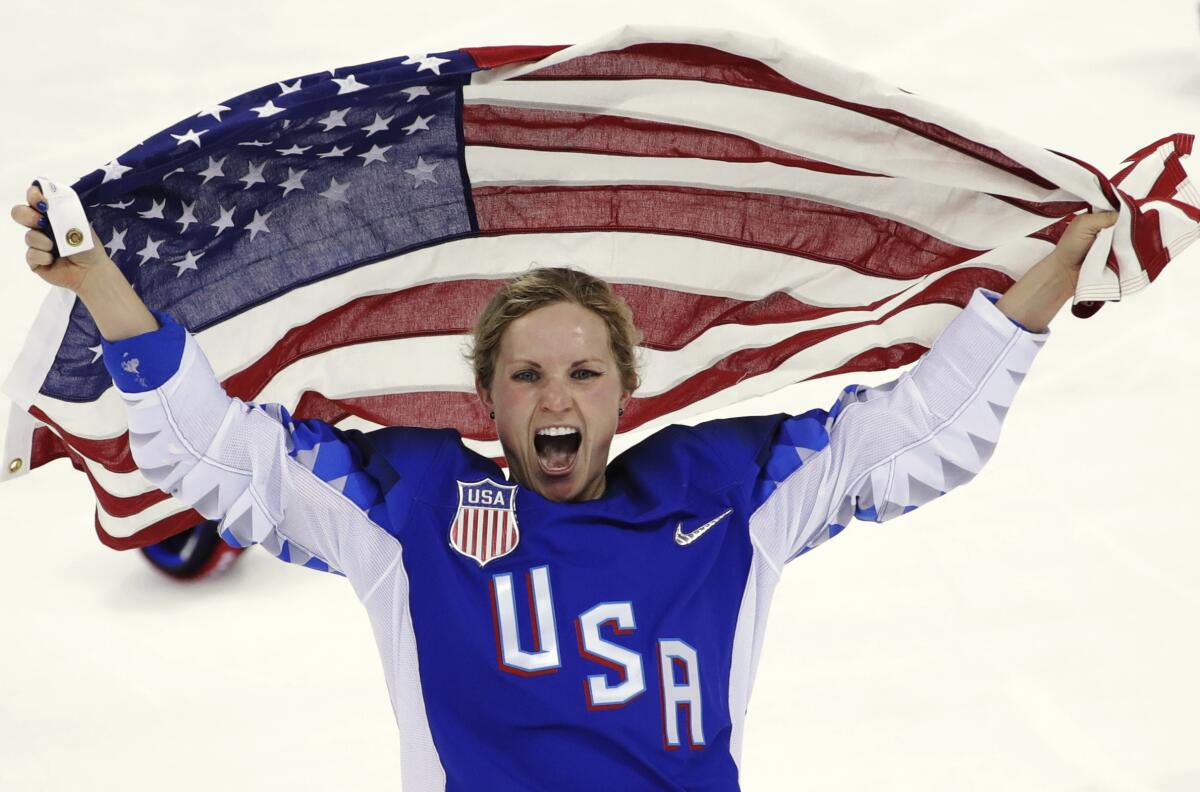
That change has begun: An agreement forged last month between the WNBA and the Women’s National Basketball Players Assn. includes provisions for players to be paid while pregnant, a child-care stipend and accommodations for working mothers.
Lamoureux-Davidson called USA Hockey a leader among the national governing boards of Olympic sports because of its support for athletes who become mothers, and former U.S. team captain Meghan Duggan is taking advantage of that as she awaits the birth of her first child with spouse Gillian Apps, a former Canadian women’s team member. The twins formed a moms support group that includes Duggan, Felix and three-time Olympic bobsled medalist Elana Meyers Taylor, whose first child is due in March.
“Having the support of USA Hockey has been really instrumental in making us feel comfortable in coming back in the time frame that we have,” Lamoureux-Morando said.
They still have to plan each day carefully and be ready for unexpected challenges, but that’s a happy task. “Like Jocelyne said, it’s being present in the moment and being where your feet are and taking it one day at a time,” Lamoureux-Morando said.
That’s a good philosophy for hockey, motherhood and everything else in life.
He has been injured, questioned his game and his girlfriend dumped him. But he still managed to win Sunday.
More to Read
Go beyond the scoreboard
Get the latest on L.A.'s teams in the daily Sports Report newsletter.
You may occasionally receive promotional content from the Los Angeles Times.


